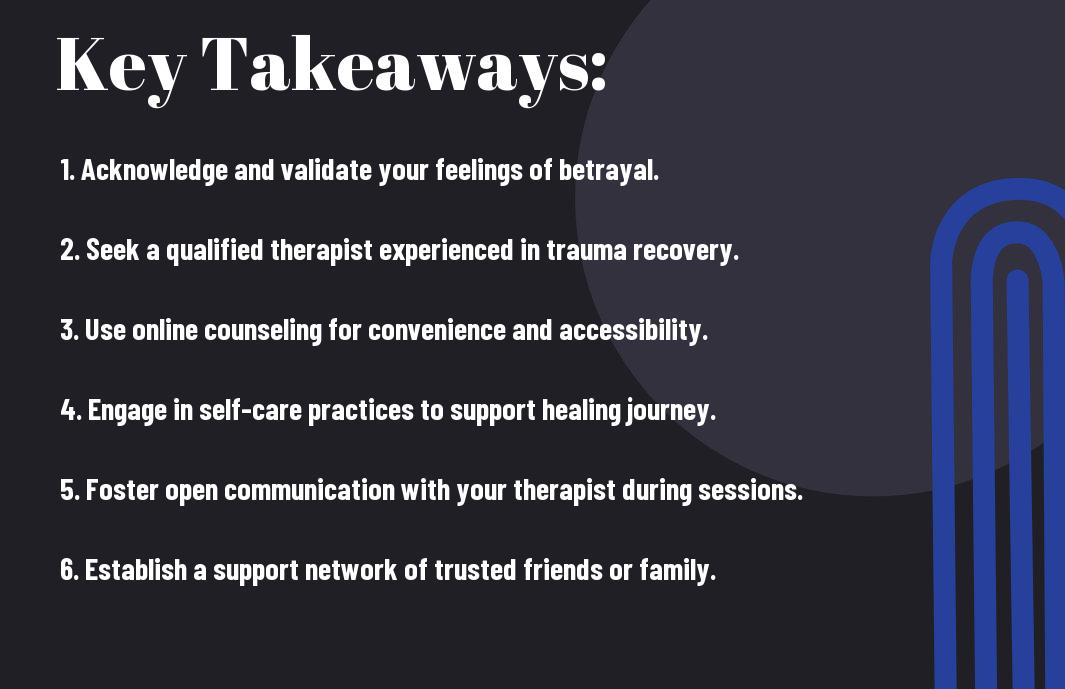Betrayal can leave deep emotional scars that affect your mental well-being and relationships. Fortunately, online counseling offers a safe, flexible, and accessible avenue for healing. With the guidance of a professional, you can navigate your feelings, learn coping strategies, and regain a sense of trust and empowerment in your life. This post will explore how you can effectively utilize online counseling to address and heal from betrayal trauma, helping you to move forward and rebuild your emotional resilience.
Key Takeaways:
- Online counseling provides a convenient and accessible platform for individuals dealing with betrayal trauma.
- Therapeutic techniques such as cognitive-behavioral therapy (CBT) can effectively address feelings of betrayal and help reframe negative thoughts.
- Building a trusting relationship with a counselor can foster a safe space for exploring emotions related to betrayal.
- Journaling and reflective exercises recommended by counselors can aid in processing traumatic experiences and emotions.
- Support groups and online forums can complement counseling by providing community support from others with similar experiences.
- Practicing self-care routines, including mindfulness and grounding techniques, can help individuals manage stress and trauma symptoms.
- Setting realistic goals during the counseling process allows individuals to track progress and celebrate small victories in healing.

Understanding Betrayal Trauma
The experience of betrayal trauma can disrupt your sense of safety and trust, leading to a profound emotional impact. This type of trauma often arises from betrayal by someone you rely on, such as a partner or close friend, and can manifest as feelings of deep loss, confusion, and anxiety. Understanding the nuances of betrayal trauma is vital for facilitating your healing journey.
Definition and Symptoms
On a basic level, betrayal trauma refers to the emotional and psychological distress caused by significant trust violations. Symptoms may include persistent anxiety, intrusive thoughts, emotional numbness, and difficulty forming future relationships. As you navigate these symptoms, it’s important to engage with your feelings to foster understanding and healing.
The Impact on Mental Health
About betrayal trauma can significantly impair your mental health, leading to issues such as depression, anxiety disorders, and post-traumatic stress symptoms. The emotional distress resulting from betrayal often leaves you feeling isolated and misunderstood, which can exacerbate your symptoms and prevent you from fully engaging in relationships.
Hence, the effects of betrayal trauma can be profound, often leaving you in a cycle of emotional distress that undermines your well-being and daily functioning. This trauma can compromise your ability to trust others, making you overly vigilant or withdrawn. It’s imperative to acknowledge the emotional toll this betrayal takes, as it can also lead to feelings of shame and inadequacy. Engaging with a counselor can provide you with the support necessary to break this cycle and begin the journey towards healing.
The Role of Online Counseling
Even in the aftermath of betrayal trauma, online counseling serves as a supportive lifeline, offering you a space to process your emotions and experiences. The convenience of therapy conducted from home allows you to find the guidance you need without added stressors. Through digital platforms, you can access trained professionals who specialize in trauma recovery, helping you navigate the complexities of your feelings.
Benefits of Online Therapy
Against traditional therapy, online therapy provides flexibility and accessibility that can significantly enhance your healing process. You can choose appointment times that fit your schedule, allowing you to engage in therapy without interruptions. Additionally, the anonymity of virtual sessions may encourage you to open up more freely about your experiences.
Finding the Right Therapist
Between the vast array of online therapists available, choosing the right one for your needs is imperative. It’s important to look for a therapist who specializes in betrayal trauma, as their expertise will be integral to your healing journey.
Understanding your options and preferences can empower you in this search. Look for therapists who focus on betrayal trauma and check credentials to ensure they fit your needs. You might consider reading reviews or even scheduling a short introductory session to gauge compatibility. This step can significantly impact your progress, as having a trustworthy therapist will help you feel more comfortable sharing your feelings, thus fostering a healing environment. Don’t hesitate to reach out to multiple therapists until you find the one who resonates with you and your journey.
Techniques for Healing
Now that you understand the impact of betrayal trauma, it’s important to explore effective techniques for healing. Engaging in online counseling can provide you with the tools you need to process your emotions and rebuild your life. To learn more, check out Healing from Betrayal Trauma: Your Path to Recovery with Online Therapy.
Cognitive Behavioral Therapy (CBT)
The practice of Cognitive Behavioral Therapy (CBT) allows you to identify and challenge negative thought patterns stemming from betrayal trauma. Through structured sessions, you will learn to replace harmful beliefs with constructive, empowering ones, ultimately fostering a healthier mindset and coping strategies.
Mindfulness and Self-Compassion
Healing from betrayal trauma involves cultivating mindfulness and self-compassion. These techniques encourage you to stay present and view your feelings without judgment, promoting emotional resilience. By practicing mindfulness, you can develop a deeper awareness of your thoughts and emotions, allowing you to process your experience in a more constructive way.
Another significant advantage of mindfulness is developing a sense of self-compassion. By treating yourself kindly, especially during moments of pain, you create a safe space for healing. Engaging in mindfulness may also reduce symptoms of anxiety and depression, fostering a sense of empowerment and clarity. This journey encourages you to be gentle with yourself, enabling you to embrace your emotions without becoming overwhelmed.
Building a Support System
After experiencing betrayal trauma, it’s vital to establish a solid support system that understands your feelings and journey. This network can provide emotional validation, encouragement, and companionship as you navigate through the healing process. Surrounding yourself with trustworthy individuals who respect your experience can create a safe environment for open communication and shared healing.
Importance of Community
Between your personal connections and the support network you build, having a sense of community can significantly impact your recovery. Engaging with individuals who have faced similar challenges can bring solace and understanding, reinforcing that you are not alone in your struggles. This sense of belonging can enhance your emotional resilience and allow you to heal more effectively.
Engaging with Support Groups
Behind a supportive community, you may find that engaging with organized support groups can be highly beneficial. These groups provide a platform where you can connect with others who share similar experiences and feelings. Here, you can find a collective strength that empowers your healing process and enriches your understanding of betrayal trauma.
Hence, joining support groups can be an invaluable step in your healing journey. Participants share their stories, coping strategies, and resources, which can lead to significant growth and comfort in knowing that others have faced similar pain. Additionally, these groups foster an environment of shared understanding and compassion, helping you feel valued and validated. As you engage with others, you may discover new insights that aid your emotional recovery. Ultimately, surrounding yourself with a community that understands betrayal trauma can be a transformative part of your healing journey.

Setting Boundaries and Self-Care
Many individuals recovering from betrayal trauma find that establishing boundaries is necessary for their emotional well-being. By clearly defining what behaviors are unacceptable, you empower yourself to protect your mental space from further harm. This proactive approach allows you to regain control over your feelings and experiences, fostering a healthier relationship with yourself and others.
Establishing Personal Boundaries
Among the most important steps in healing is setting personal boundaries that reflect your needs and values. These boundaries help you communicate effectively with others and reinforce your self-worth, ultimately allowing you to navigate your relationships more sincerely and authentically.
Prioritizing Self-Care Practices
About your healing journey, self-care practices are foundational in nurturing your emotional health. Engaging in activities that bring you joy or relaxation can significantly improve your resilience and overall well-being.
Hence, prioritize self-care by integrating activities that encourage relaxation, such as meditation or gentle exercise, into your routine. Taking a few moments each day for mindfulness or connecting with nature can profoundly impact your mental state. Additionally, nourishing your body with healthy foods and getting adequate sleep contributes to rebuilding your strength. By making these practices consistent, you create a supportive environment that fosters healing and reinforces your ability to cope with the aftermath of betrayal.

Long-Term Strategies for Recovery
Once again, healing from betrayal trauma requires a sustained commitment to your emotional well-being. Developing long-term strategies for recovery can facilitate lasting change. You might consider integrating practices such as mindfulness, journaling, and establishing strong support systems into your daily life. Additionally, remaining open to ongoing therapy can provide the guidance and accountability necessary to help you navigate emotional hurdles and restore your sense of self-trust.
Ongoing Therapy and Reflection
Above all, engaging in ongoing therapy offers a valuable avenue for self-discovery and healing. Regular sessions enable you to confront unresolved feelings and develop deeper insights into your experiences. Through consistent reflection and professional support, you will learn to process your emotions constructively, equipping you to manage triggers more effectively in the future.
Embracing Forgiveness and Growth
After a betrayal, an necessary step in your recovery is embracing the concepts of forgiveness and personal growth. This doesn’t mean excusing the betrayal but rather aiming to release the weight of anger and resentment that may hinder your emotional progress. By focusing on your growth, you can transform your pain into a source of strength and resilience.
Consequently, embracing forgiveness can serve as a profound catalyst for healing. When you let go of bitterness, you free yourself from the emotional burden of the past, allowing space for positive change. This journey is about reclaiming your power and moving forward with intention and grace. Cultivating a mindset of growth helps you recognize that despite the betrayal, your experiences can equip you with invaluable lessons, fostering resilience and deeper connections with others.
Conclusion
From above, you can see that healing from betrayal trauma is a journey that can be effectively supported through online counseling. By engaging with a qualified professional, you can explore your feelings, develop coping strategies, and foster a deeper understanding of your emotional responses. Leverage the convenience of online sessions to fit therapy into your schedule, making it easier to prioritize your mental health. As you navigate this healing process, be gentle with yourself and recognize that progress takes time and self-compassion.
FAQ
Q: What is betrayal trauma and how does it affect individuals?
A: Betrayal trauma occurs when someone close to you, like a partner or family member, violates your trust in a significant way. This can lead to feelings of anxiety, sadness, and a sense of loss. Those affected might experience emotional disturbances, such as difficulty trusting others or developing a heightened sense of vigilance. The impact can be profound, affecting personal relationships and overall mental well-being.
Q: How can online counseling assist in the healing process from betrayal trauma?
A: Online counseling offers a safe space for individuals to express their feelings and process the trauma they have experienced. With the convenience of video calls or messaging, clients can engage with licensed therapists who specialize in trauma-informed care. This flexibility ensures that individuals can access support from the comfort of their homes, making it easier to address sensitive topics without the added stress of in-person visits.
Q: What are some common therapeutic approaches used in online counseling for betrayal trauma?
A: Many therapists utilize approaches like Cognitive Behavioral Therapy (CBT) to help clients reframe negative thought patterns and build coping strategies. Additionally, Eye Movement Desensitization and Reprocessing (EMDR) may be employed to process traumatic memories safely. Other techniques include narrative therapy, which allows individuals to articulate their experiences, and mindfulness practices that help in managing emotional distress.
Q: How can individuals find the right online counselor for betrayal trauma?
A: To find a suitable online counselor, individuals can start by seeking recommendations from trusted sources or researching mental health platforms that specialize in trauma. It’s important to look for therapists with experience in treating betrayal trauma specifically. Reading reviews, checking credentials, and considering a preliminary consultation can also help gauge compatibility between the client and counselor.
Q: What should individuals expect during their first online counseling session regarding betrayal trauma?
A: During the first session, individuals can expect to discuss their reasons for seeking help and any specific experiences related to betrayal trauma. The counselor will likely ask questions to better understand the client’s background and emotional state. It’s also an opportunity to establish rapport and set goals for therapy. Clients should feel empowered to share at their own pace, ensuring a supportive environment for healing.
